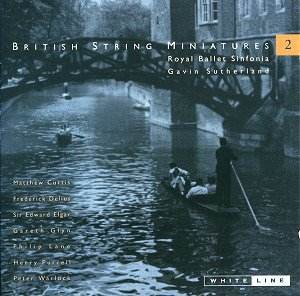Gavin Sutherland and the Royal Ballet Sinfonia
continue their highly recommendable collaboration with a British
String Miniature brace of discs, of which this is the second.
Moreover the selection is astute and listening is a sheer pleasure
due to the variety of inspirations and idioms – others in their
series have perhaps been rather less digestible in this respect.
So the disc begins with Arthur Bliss’s arrangement – and a very
respectful, un-Rout one at that – of some Purcell dance tunes.
There’s an absence of swaggering grandiosity and an appealing
generosity to them and I was particularly impressed by the delicate
string playing in the third movement Sarabande. Warlock’s Serenade
brings its Delius saturated tribute – coagulated if you’re unsympathetic
– and one that threatens any moment to turn into Brigg Fair and
ends with that Elgar Introduction and Allegro pizzicato. Gareth
Glyn was born in 1951 and lives in Anglesey, whose sketches he
has evoked here with lyricism and colour. They date from 2001,
are in five named movements starting with a reverie and ending
in an Elegy of some depth. That opener is open-spaced and lyric,
one that rises and falls over pizzicati underpinning in a gently
effortless way. The pastorale ("Malltraeth") is by contrast
jaunty and blustery and just mildly capricious too but with some
gorgeous melodies embedded into it. The evocative Intermezzo is
followed by the frolicsome naughtiness of the Scherzo before a
keening solo cello adds even more plangency to Moelfre, the final
movement, one that alludes to the treacherous stretch of coast
of the same name that has cost so many lives. Once more good programming;
Delius’s delightful 1915 Air and Dance acts as a breaker before
Matthew Curtis’s Serenade, written in 1993 and revised for this
recording in 2001. In three movements I greatly liked the easy
fluency of the opening Spring Song with its admixture of breezy
generosity; some beautiful lower string pointing as well. The
central Elegy has nobility but also rises to affectionate lyricism
as well whilst the tarantella finale goes with breezy drive and
vigour. It’s Elgar’s turn to separate the contemporary composers
this time or Elgar/Young to be exact in the form of the suite
from The Spanish Lady. Of the five scenes it’s the Sarabande that
really shines, especially in this performance – really vital and
attractive playing. Philip Lane’s Serenata Concertante finishes
the disc. Written in the 1970s originally for brass band it was
rewritten for strings in 1990 and even draws on a youthful melody,
composed when Lane was a teenager, as the main theme of the second
movement Adagio. As Lane mentions in his notes the concerto grosso-like
first movement features a fine quartet set against a body of strings
(listen to Helen Kamminga’s especially eloquent viola). The Adagio
opens desolately, full of yearning and tremolando eeriness; also,
too, a sense of stasis, reflection and reminiscence. His youthful
melody is indeed rather beautiful. The Vivace finale is zestful,
rhythmically imaginative and very confidently scored.
A charmer of a disc, recorded in a natural acoustic
with to the point notes from Philip Lane; the interspersed Elgar,
Delius and Warlock add balance and historical perspective to the
contemporary work and the Purcell-Bliss is an old fashionedly
delightful starter. Strongly recommended.
Jonathan Woolf
